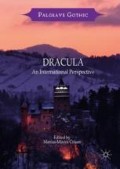Abstract
In recent film adaptations of the Dracula mythos, the arch-vampire has increasingly been steered by the popular culture towards starting a family and defending it. This goes against decades of cinematic treatment of vampirism where, traditionally, the patriarchal family values were restored by the ritual destruction of the vampire by his mortal opponents. Early horror movies presented the sons and daughters of Dracula as threatening and deadly—and they were hardly ever his physical progeny to begin with. The post-modern Dracula seems to enjoy, and endorse, child-centred family life. Is this a new cultural beginning for Dracula, or a case mid-undeath crisis?
Access this chapter
Tax calculation will be finalised at checkout
Purchases are for personal use only
Bibliography
Auerbach, Nina. Our Vampires, Ourselves. Chicago and London: University of Chicago Press, 1995.
Badinter, Elisabeth. Mother Love: Myth and Reality. New York: Macmillan, 1981.
Badinter, Elisabeth. XY, on Masculine Identity. New York: Columbia University Press, 1995.
Bram Stoker’s Dracula. Directed by Francis Ford Coppola. 1992. United States: Columbia Pictures. Film.
Bunbury, Stephanie. “Forget Vlad the Impaler, it’s Vlad the dad in Dracula Untold.” The Sydney Morning Herald, September 26, 2014, accessed December 10, 2016, http://www.smh.com.au/entertainment/movies/forget-vlad-the-impaler-its-vlad-the-dad-in-dracula-untold-20140923-10ksrl.html.
Burns, Sean. “Hotel Transylvania Isn’t Awful—Just Terribly Pleasant.” Philadelphia Weekly, September 26, 2012, accessed December 10, 2016, http://www.philadelphiaweekly.com/screen/capsules/hotel_transylvania-171205191.html.
Coltrane, Scott. “Fathering: Paradoxes, Contradictions and Dilemmas.” In Handbook of Contemporary Families: Considering the Past, Contemplating the Future, edited by Marylin Coleman and Lawrence H. Ganong, 224–243. London: Sage Publications, 2004.
Craft, Christopher. “Kiss Me With Those Red Lips: Gender and Inversion in Bram Stoker’s Dracula.” Representations No. 8 (Autumn 1984): 107–133.
Dracula and Son (Dracula père et fils). Directed by Edouard Molinaro. 1976. France: Gaumont. Film.
Dracula’s Daughter. Directed by Lambert Hillyer. 1936. United States: Universal Pictures. Film.
Dracula’s Greatest Love (El gran amor del Conde Drácula). Directed by Javier Aguirre. 1973. Spain: Janus Films. Film.
Dracula Untold. Directed by Gary Shore. 2014. United States: Universal Pictures. Film.
Faludi, Susan. Backlash: The Undeclared War Against American Women. New York: Crown, 1991.
Fearless Vampire Killers, The. Directed by Roman Polanski. 1967. United States: Metro-Goldwyn-Mayer. Film.
Foundas, Scott. “Film Review: Dracula Untold.” Variety, September 30, 2014, accessed December 10, 2016, http://variety.com/2014/film/reviews/film-review-dracula-untold-1201317748/.
Frappier, Rob. “Dracula Untold: Director Talks Possible Sequel Story.” Screen Rant, November 10, 2014, accessed December 10, 2016, http://screenrant.com/dracula-untold-sequel-story/.
Holte, James Craig. Dracula in the Dark: The Dracula Film Adaptations. Westport: Greenwood Press, 1997.
Hotel Transylvania. Directed by Genndy Tartakovsky. 2012. United States: Columbia Pictures. Animated film.
Hotel Transylvania 2. Directed by Genndy Tartakovsky. 2015. United States: Columbia Pictures. Animated film.
Interview with the Vampire, The. Directed by Neil Jordan. 1994. United States: Warner Bros. Film.
Johnson, Kevin C. “Latest instalment of Dracula is best left untold.” St. Louis Today, October 9, 2014, accessed December 10, 2016, http://www.stltoday.com/entertainment/movies/reviews/latest-installment-of-dracula-is-best-left-untold/article_435c33a2-b440-5ab2-a6fc-fb528874242b.html.
Let the Right One In (Låt den rätte komma in). Directed by Tomas Alfredson. 2008. Sweden: Sandrew Metronome. Film.
Little Vampire, The. Directed by Uli Edel. 2000. Germany, Netherlands, United States: Propaganda Films. Film.
Plath, James. “Hotel Transylvania.” Movie Metropolis, January 19, 2013, accessed December 10, 2016, http://moviemet.com/review/hotel-transylvania-blu-ray-review.
Reed, Thomas L. “Belle et le Vampire: Focus and Fidelity in Bram Stoker’s Dracula.” Literature/Film Quarterly, Vol. 38, No. 4 (2010): 289–310.
Renner, Karen J. “Evil Children in Film and Literature.” In The Evil Child in Literature, Film and Popular Culture, edited by Karen J. Renner, 1–27. New York: Routledge, 2013.
Roth, Phyllis A. “Suddenly Sexual Women in Dracula.” In Bram Stoker, Dracula, edited by Nina Auerbach and David J. Skal, 411–421. New York and London: W.W. Norton, 1997.
Sedgwick, Eve Kosofsky. Between Men: English Literature and Male Homosocial Desire. New York: Columbia University Press, 1985.
Skal. David J. Hollywood Gothic: The Tangled Web of Dracula from Novel to Stage to Screen. New York: Faber and Faber, 2004.
Son of Dracula. Directed by Robert Siodmak. 1943. United States: Universal Pictures. Film.
Son of Dracula. Directed by Freddie Francis. 1974. United States: Cinemation Industries. Film.
Stevenson, John Allen. “A Vampire in the Mirror: The Sexuality of Dracula.” PMLA, Vol. 103, No. 2 (March 1988): 139–149.
Twitchell, James. Dreadful Pleasures: An Anatomy of Modern Horror. New York: Oxford University Press, 1985.
Vamps. Directed by Amy Hackerling. 2012. United States: Red Hour Films. Film.
Williams, Anne. “Si(g)ns of the Fathers.” Texas Studies in Literature and Language, Vol. 33, No. 4 (Winter 1991): 445–463.
Author information
Authors and Affiliations
Corresponding author
Editor information
Editors and Affiliations
Rights and permissions
Copyright information
© 2017 The Author(s)
About this chapter
Cite this chapter
Babilas, D. (2017). Papa Dracula: Vampires for Family Values?. In: Crișan, MM. (eds) Dracula. Palgrave Gothic. Palgrave Macmillan, Cham. https://doi.org/10.1007/978-3-319-63366-4_14
Download citation
DOI: https://doi.org/10.1007/978-3-319-63366-4_14
Published:
Publisher Name: Palgrave Macmillan, Cham
Print ISBN: 978-3-319-63365-7
Online ISBN: 978-3-319-63366-4
eBook Packages: Literature, Cultural and Media StudiesLiterature, Cultural and Media Studies (R0)

